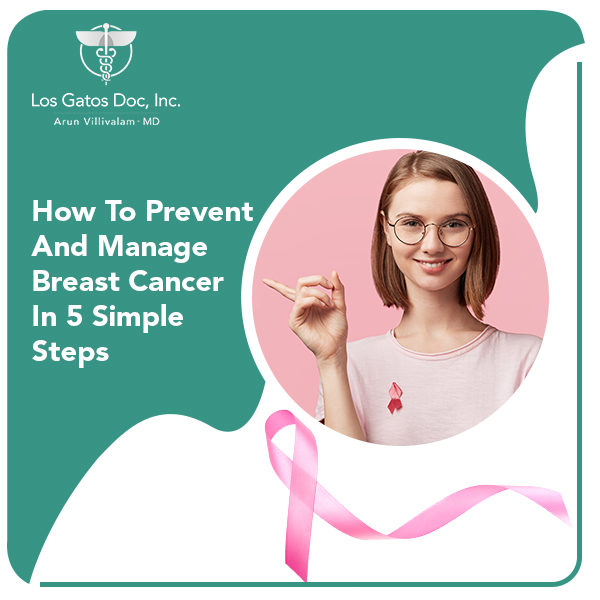Breast Cancer is the most common cancer in American women after skin cancer. It is also the second leading cause of cancer deaths in American women after lung cancer.
According to the American Cancer Society, as an American woman, your average risk of
- Developing breast cancer in your lifetime is a 13% or 1 in 8 chance.
- Dying from breast cancer is a 2.6% or 1 in 39 chance.
Breast cancer occurs mainly in women, but men can get breast cancer, too. As an American man, your lifetime risk of breast cancer is a 0.13% or 1 in 800 chance.
The latest trends in breast cancer incidence indicate that the rates have increased by 0.5% each year, but the death rate (2013-2018) has decreased. The decrease in death rates is attributed to increased awareness, screening tests, and better treatments.
There are over 3.8 million breast cancer survivors in America. They serve as a reminder to take control and prevent, manage, and win over breast cancer before it is too late.
What Is Breast Cancer?
A breast is made up of 3 main parts:
- Lobules: These are glands that produce milk.
- Ducts: These carry milk to the nipple.
- Connective tissue: These are fatty, fibrous tissue that holds everything together.
Breast cancer occurs when the cells in your breast grow out of control. There are various kinds of breast cancer depending on which cells turn cancerous.
The most common types of breast cancer are:
- Invasive ductal carcinoma: The cells in the ducts turn cancerous and grow outside the ducts into other parts of the body.
- Invasive lobular carcinoma: The cells in the lobules turn cancerous and can spread to other parts of the body.
- Ductal Carcinoma In Situ (DCIS): Here, the cancerous cells are present in the lining of the ducts only and do not spread to other tissues in the breast.
The other lesser common types of breast cancer include Paget’s disease (involving the nipple and areola) and inflammatory breast cancer (a rare and aggressive form of cancer affecting the lymph vessels).
Please note that not all breast lumps are cancerous and life-threatening. However, it’s best to consult your primary care doctor about any changes or lumps in your breasts.
How To Prevent Your Risk For Breast Cancer
Breast cancer is not an alone disease but a group of related diseases caused by a combination of our genes, lifestyle, and environment. Your breast cancer risk is made up of a combination of the below-listed factors.
Some risk factors for breast cancer include:
- Obesity
- Smoking
- Drinking alcohol
- Dense breast tissue
- Advanced age
- History of breast cancer or disease
- Greater exposure to estrogen
- Certain therapies such as hormone and radiation
You also need to note that while some cancer risk factors can be avoided or controlled, many of them cannot be prevented. You cannot control your genetic makeup, but you can manage your alcohol consumption.
Research shows that lifestyle changes can decrease the risk of breast cancer, even in women at high risk.
Here are our suggested tips to prevent breast cancer based on the AMERICAN CANCER SOCIETY’S recommendation:
- Limit Alcohol Consumption
Various studies have proven the link between alcohol and cancers, including breast cancer.
Compared to the other organs, the breast is more susceptible to the carcinogenic effects of alcohol.
The more alcohol you consume, the more you are at risk for breast cancer. As per the International Agency for Research on Cancer, adult women have a 7-10% increased risk for breast cancer for each drink they consume daily.
It is best to avoid alcohol as even small amounts can increase your risk for breast cancer.
But if you do drink, limit it to one drink a day. Try to drink alcohol occasionally instead of regularly.
- Maintain A Healthy Weight With A Diet Plan
If you are overweight or obese, especially after menopause, it increases your risk for breast cancer.
Your ovaries make most of the estrogen and your fat tissue less of it before menopause. However, after menopause, your ovaries stop producing estrogen, and most of it comes from your fat tissue. Having more fat tissue after menopause can raise your estrogen levels and risk for breast cancer.
For women of all ages, being overweight or obese can raise your blood insulin levels and risk for various types of cancer, including breast cancer.
According to the American Cancer Society, you should stay within a healthy range throughout your life by balancing a nutritional food intake with physical exercise.
Having a balanced diet can lower your risk for breast cancer. We would suggest a more plant-based diet comprising a variety of fruits, vegetables, whole grains, nuts, legumes, and healthy fats.
- Be Physically Active And Exercise Regularly
There is growing evidence that proves that regular exercise can reduce your risk for breast cancer, especially if you are past menopause.
The exact reason is unclear, but it could be the positive effects of exercise on your body weight, hormones, and inflammation.
The American Cancer Society recommends that adults get between 150 – 300 minutes of moderate-intensity or 75 – 150 minutes of vigorous-intensity exercise, or a combination of both each week.
- Take Charge Of Your Reproductive Health
It would help if you were vigilant about breast cancer detection. Keep checking for any changes, such as lumps in your breasts.
Some studies indicate breastfeeding can lower your breast cancer risk. The reason is not entirely clear or conclusive. Still, it could be because of the positive effects of reducing the total number of lifetime menstrual cycles in breastfeeding women.
The longer you breastfeed, the higher the protective effect against breast cancer.
Another factor to consider is birthing children. Women who have their first child with a full-term pregnancy at an early age have a lower risk for breast cancer. However, the link between childbirth and breast cancer is complex as your risk for breast cancer, specifically hormone receptor-negative breast cancer, is higher in the first decade after your child’s birth. In this particular case, your risk for breast cancer lowers over time.
You may also want to consider your contraception methods as there’s some evidence linking it to breast cancer. It’s best to consult your family doctor for consultation and understand the various risk factors and benefits.
- Visit Your Primary Care Doctor Regularly
If you notice any abnormal changes in the skin of your breasts or feel any lumps, you should consult your doctor immediately.
Even if you don’t have any issues, it’s good to check with your doctor about mammograms and other screenings such as your vitamin D levels as there is some evidence linking low levels to breast cancer.
Many breast cancers can be detected early on before they can be felt or the symptoms develop during the screenings.
Our top suggestions include:
- Regular doctor visits, once or twice a year, specifically for current risk assessment.
- Starting yearly mammograms if you’re above 45 years or breast MRI as per your doctor’s recommendation.
- Discuss all risks and benefits of your contraceptive options with your doctor.
Conclusion
A large part of preventing and managing breast cancer lies in your hands. You can implement the above strategies in your life right now and take charge of your health.
If you want to reach out for consultation on Lifestyle and Stress Management, you can contact Los Gatos Doc, the best primary care doctor near Campbell, CA.
Disclaimer: We routinely draw upon public health resources to inform our write-ups. Information in this article may be drawn up from multiple public health sources, including:
- Centers for Disease Control & Prevention
- Medline Plus
- National Institutes of Health
- American Medical Association
- American Association of Family Physicians
- Mayo Clinic
- Family Doctor






